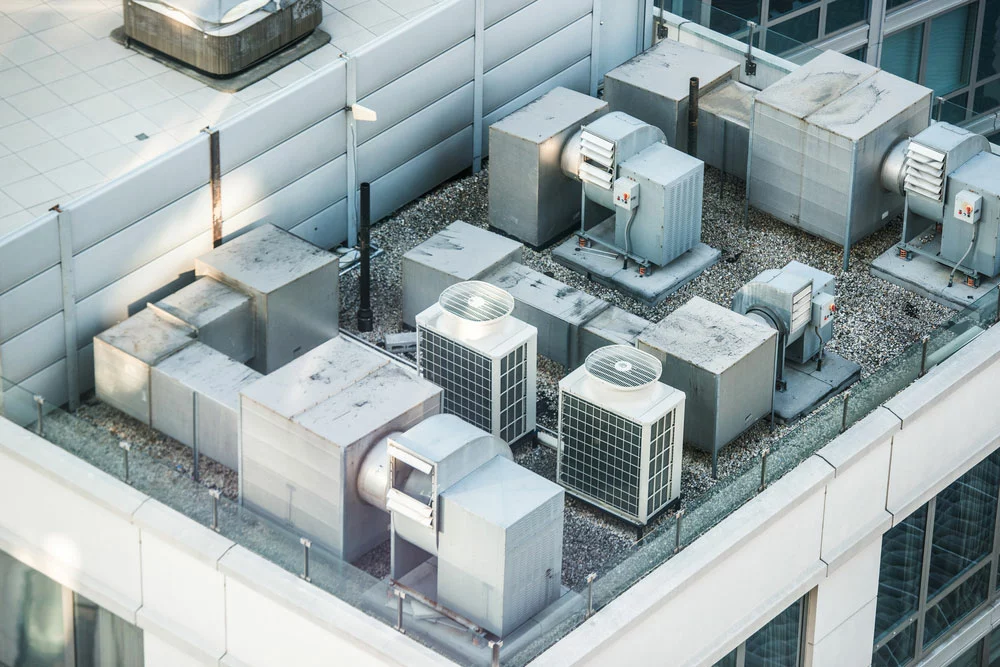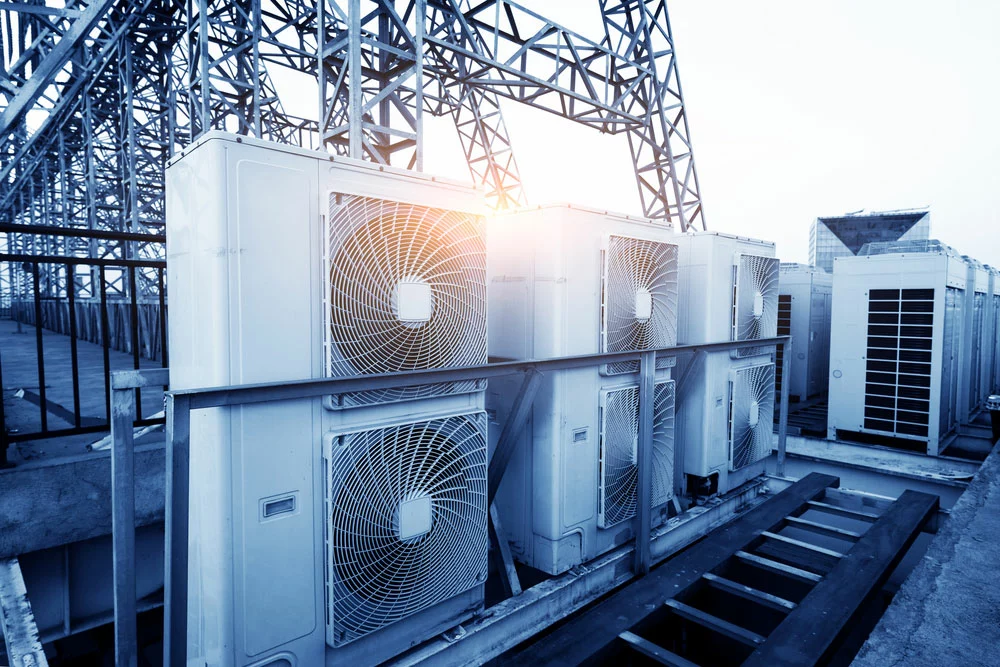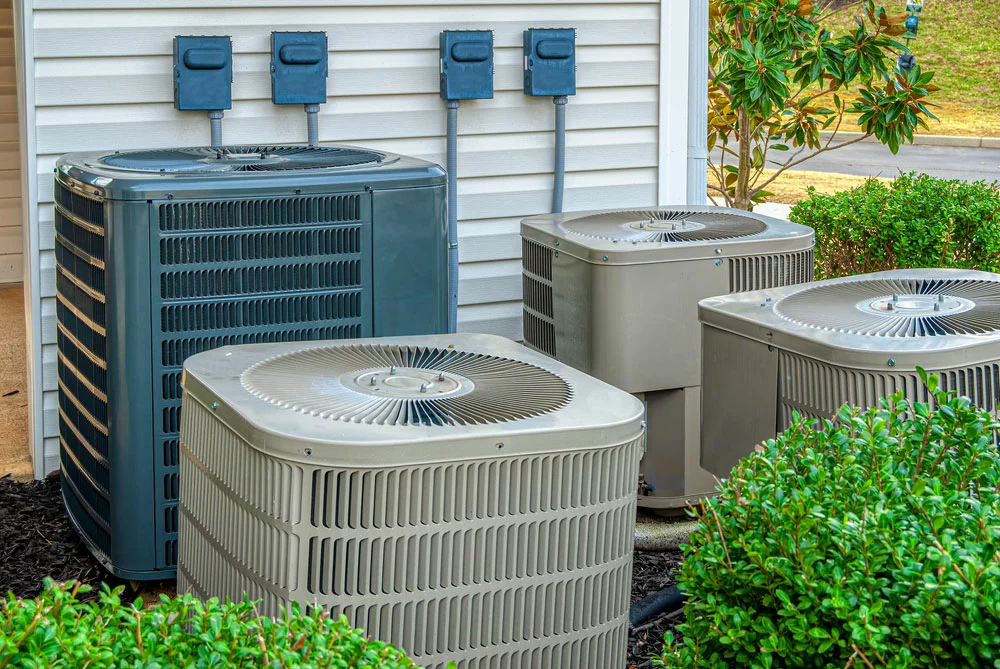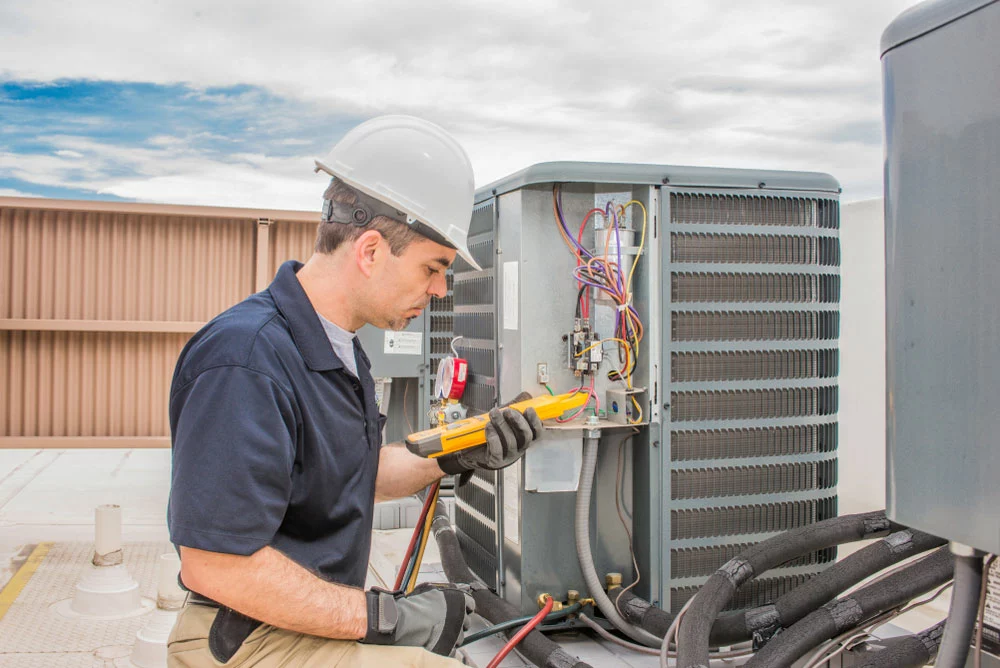The HVAC system U.K was once beyond the reach of most people because of the high cost. Hence, only professionals and wealthy people used the system. However, the industry is now more accessible, and anyone can own one.
Interestingly, most people refer to HVAC as air conditioning, but what does it mean? Will it cool or heat your home? And more importantly, what’s the difference between HVAC and air conditioning?
This article will explore HVAC systems and break down the differences between them and air conditioners.
What is an HVAC?

HVAC systems on top of a roof
HVAC stands for heating, ventilation, and air conditioning. These systems combine the features of heaters and cooling units into one piece of equipment. Interestingly, HVACs provide impressive ventilation, which helps to remove moisture from your space.
In addition, HVACs can be any shape and size, and the benefits offered depends on their designs & your application. Usually, HVAC systems come with the following units:
- Air conditioning units
- Boilers
- Duct and moisture vents
Although it’s easy to mistake HVACs for air conditioning units, it’s only a misconception. These systems are more like an umbrella housing different air control systems.
How do HVAC Systems Work?

An HVAC outer unit
Sometimes, the components of an HVAC system may work independently. However, it’s more common for them to work alongside each other. Interestingly, these combined systems can feature AC systems and central heating systems.
Moreover, your HVAC system is not only beneficial for heating or cooling your work or home space. These units can also enhance indoor air quality and make the environment comfortable.
Although these systems feature several variations, they all have the same working principle–and it starts from the outside. HVAC units source and process outdoor air through a ventilation process. Interestingly, you can ventilate your environment in two ways:
Mechanical Ventilation
Mechanical ventilation involves using machinery to move air in and out of a building. In truth, older architectures use natural ventilation in most buildings by providing doors and windows. And these outlets quickly draw air outdoors, making them available indoors.
However, newer architectures offer something different. Interestingly, builders now create tightly-sealed homes with fewer outlets for natural ventilation. As a result, mechanical ventilation is of utmost importance, especially for houses with HVAC systems.
Further, specially designed units allow air to enter the building. But when this air passes through the filter, the system immediately routes it to areas with more demand. Interestingly, you can use these mechanical systems to clear dust & dirt, allergens, and other lingering particles.
Also, the same air the system draws from outside will work for the heating and cooling process while preventing excess humidity. Lastly, the system returns the air outdoors once the cycle is complete. In short, these systems have duct networks that allow air to flow freely through the building’s structure.
Natural Ventilation
You don’t need special equipment, add-ons, or constructions to ventilate your home naturally. In truth, most homes have natural ventilation in the form of exit and entry points. However, natural ventilation involves allowing air to move through your home without the aid of mechanical systems.
Natural ventilation can help replenish oxygen levels, remove odors, and reduce humidity. Also, it filters carbon dioxide efficiently.
Components of an HVAC System

HVAC systems outside a building
As mentioned earlier, HVAC is a broad term encompassing multiple units. Here are the components you can find in HVAC systems.
Air Return
Air return is the unit that marks the beginning of your ventilation cycle. This component sucks in the air and passes through a filter before transferring it into the system. However, the air return may need regular cleaning and maintenance as debris and dust can accumulate on your filters.
Air Ducts
Ducts are the channels that provide passages for airflow. So, cooled or heated air flows through these ducts to reach their required destination. Nevertheless, ducts need cleaning every two to five years to avoid reduced efficiency.
Blower
The blower is responsible for drawing air from the HVACs’ primary section. Also, your system will enjoy more durability if air flows efficiently through this component.
Coils
This component cools the air flowing through it, but with some assistance from the refrigerant. So, coils need yearly check-ups to ensure maximum efficiency. But if they freeze, it’s time to check your refrigerant levels and filter.
Compressor
HVAC compressors are similar to their refrigerator counterparts. However, these components can transform refrigerants from gas to liquid before transferring them to the coil.
Interestingly, compressors are notorious for causing various system failures. So, try checking it if something goes wrong.
Exhaust Channels
Exhaust channels help to remove any waste created by the heating system. So, it’s best to inspect your vent stack or chimney flue annually and make upgrades if necessary.
Electrical Elements
This group hosts a range of electrical components ranging from batteries to circuits. However, if there’s a problem, it’s most likely with the electrical system. So, check for dead batteries or tipped breakers before opting for more serious solutions.
Filter
The filter comes after the air return. This component separates harmful substances from the flowing air, preventing debris and dust from damaging the HVAC system. Plus, changing the filter frequently is crucial to keep your system in top condition.
Outdoor Unit
The outdoor unit is the component housing the fan providing airflow. Moreover, this unit must be free from debris and plants. Otherwise, you’ll have problems when it sucks in nearby vegetation.
What’s the Difference between HVAC and Air Conditioning

Man working on an HVAC system
It’s easy to mistake an HVAC system for an AC unit. Although air conditioning makes up the last portion of the “HVAC” acronym, you can’t use it to describe any type of heating or cooling device. So, if HVAC is the all-encompassing term, ACs are one piece of the puzzle.
How Many Years Can an HVAC System Last?
Your HVAC’s lifespan and durability depend on several factors. The dominant one is the type you purchase.
Naturally, a higher quality system will provide incredible lifespan and durability. But regular maintenance, cleaning, and inspections can make any system last for years.
Final Thoughts
HVAC systems are perfect for adding heating, cooling, and ventilation to your home. Although they started as expensive equipment, these units have become more common due to technological advancements.
However, HVACs may sound mighty, but they’re not immune to damage. Ensure you clean and maintain them regularly to ensure you’re getting maximum performance. Some components may require professional cleaning services, so keep that in mind.
In addition, we recommend contacting your local heating and air conditioning professionals if you want to replace your existing system or purchase one.
